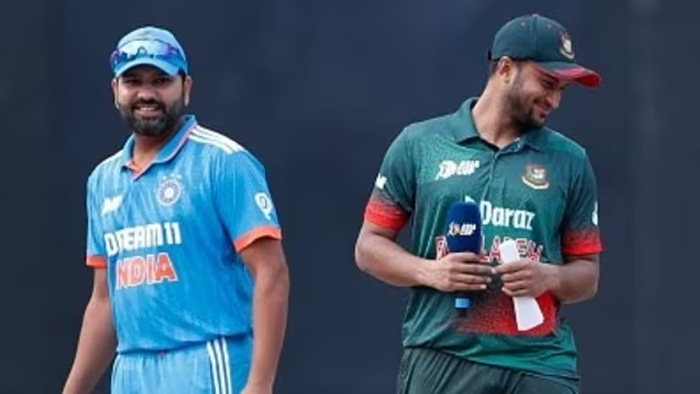Move over India-Pakistan, India vs Bangladesh is the rivalry this World Cup has been waiting for
In 1979, at the second men’s World Cup, India lost all three league clashes, going down to even Sri Lanka, who didn’t enjoy Test status at the time.
That hardly raised a murmur; limited-overs cricket was considered a hit-and-giggle format both by the players and the administrators, and by the fans who didn’t expect much of their favourite stars.
All that changed four years later when, ripping the form and prediction book to shreds, Kapil Dev’s side scripted history and changed the face of one-day cricket. Champions in 1983, India reached the semifinals in 1987, battled hard and won a couple of games though they couldn’t qualify for the knockouts in 1992, were again knocked out in the semis in 1996, made it to the Super Six in England in 1999 and went all the way to the final in 2003, when they were bested by Australia.
When Rahul Dravid led India out to the 2007 World Cup in the Caribbean, it was with great expectations. India had a fabulous batting line-up – Virender Sehwag, Sourav Ganguly, Sachin Tendulkar, the skipper himself, Yuvraj Singh and Mahendra Singh Dhoni – and a gun bowling group that included Zaheer Khan, Ajit Agarkar, Harbhajan Singh and Anil Kumble. They were placed in Group B, alongside Bangladesh, Bermuda and Sri Lanka; with the top two sides going through to the next phase, India’s qualification was considered a mere formality.
In a stunning upset that shook up the cricketing firmament, mighty India were brought to their knees by Bangladesh in their opening game in Port of Spain, bowled out for 191 and going down by five wickets with Tamim Iqbal, Mushfiqur Rahim and Shakib Al Hasan, all young guns, making half-centuries. It was India’s darkest World Cup hour, compounded a few days later when Sri Lanka swatted them aside. India’s campaign had ended even before it started; Greg Chappell quit as coach within weeks and even though Dravid had led the Test side to a series win in the Caribbean the previous year and would do so in England a few months after the World Cup misadventure, his legacy as captain would always be the catastrophe in the land of the Calypso.
India have had by far the better of the exchanges against Bangladesh in all formats; in ODIs, Big Brother leads 31-8 in 40 encounters but Bangladesh have won three of the last four 50-over contests between the teams, including in the Asia Cup in Colombo last month. There is something about India that brings the best out of Bangladesh; there is also something about India that brings the worst out of Bangladesh when it comes to player behaviour.
One is not sure exactly when this non-rivalry first fired the Bangladeshis up. Maybe it was in January 2010 when, standing in for an injured Dhoni, skipper Sehwag proclaimed ahead of a Test match, “Bangladesh are an ordinary side. They can’t beat India because they can’t take 20 wickets.” Maybe it grew further in March 2015 when Rohit Sharma was caught on the boundary off a full toss in the World Cup quarterfinal in Melbourne, only for the ball to be ruled above waist high and therefore a no-ball. Maybe it reached a crescendo 12 months later in Bengaluru in the T20 World Cup, when Bangladesh needed ten to win off five deliveries, Mushfiqur hit two fours and celebrated wildly, and then became the first of three batters to be dismissed in succession to hand India a one-run heist. Or maybe, most likely, it was a combination of all this, exacerbated by Bangladesh’s inability to complete the job despite running India close in the 2019 World Cup in England and the 2022 T20 World Cup in Australia.
The 2-1 victory at home last December is certain to have done wonders for Bangladesh’s confidence as they approach Thursday’s fixture in Pune against the marauding hosts, but they won’t be unaware that at home and on the World Cup stage, India won’t be as forgiving. Where India are sitting on a three-match winning streak, Bangladesh have lost two on the bounce after starting with a victory against Afghanistan. The pressure is on Shakib’s side to do the running if they aspire for a semifinal berth, but they will have to contend with India’s propensity to rise to the occasion in tournaments of this magnitude. Shakib acknowledged not long back that emotion is often Bangladesh’s worst enemy; Thursday will be a good time for cool heads and sensible decision-making.

